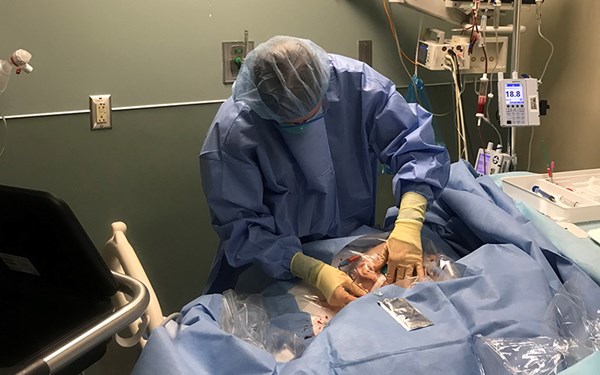What counts as the "first day"? Is it the intern welcome party? Hospital orientation? When computer access is finally granted? The intern class of 2020 has had a very different experience.
There was no party, and most of orientation was online. Regardless of those differences, the first day was the same as the year prior: The true first day is when the intern walks into the emergency department, cleans off a workspace, and signs up to see someone who has come to the hospital for a specific reason. At times the patient does not know what that reason is; all they know is something is wrong, and the emergency department is the best place to get help. The intern then interprets the story the patient tells with words and physical examination to decide what further evaluation needs to be done. At the end of the first day there are likely feelings of excitement, because an official prescription with the intern’s signature and credentials were given to the patient at discharge; relief at having survived the shift and "done no harm," and humility, realizing there is still so much to learn.
The intervening days are similar to the first: full of excitement, curiosity, feelings of inadequacy, fatigue, and self-satisfaction. These feelings change to the extent they could be modeled with a sine wave. This constant fluctuation can be challenging because many interns have the expectation of linear growth in their clinical aptitude. The discord between reality and expectations has a light and dark side. The dark side leads to imposter syndrome, dreading shifts, or second-guessing every decision. The light side motivates interns to study more, pay close attention to detail, and be humble enough to learn pearls and wisdom from everyone they can.
So as time ticks onward, what is an intern to do?
Show up.
It's essential for the resident to just show up: to the ED, to ultrasound training, zoom conferences, and every patient room possible. This requires more than a physical presence; it means being mentally and physically present. When the intern is in Room 5, they are not thinking about Room 10, their dinner, or how they missed the intubation in Room 2.
In the process of balancing all of these responsibilities, Day 60 will have come and gone without a second thought because there is nothing magical about 60 days of internship. It will come and go in a blur of central lines, dizzy 80-year-olds, intubations, and sprained ankles. It will pass by while writing MDMs, consult requests, and prescriptions for ondansetron. The sine wave continues to progress with peaks and troughs, but also with an upward linear trajectory. There is no better way to have it; the intern cannot be focusing on when they'll "know what they are doing" because the continued pursuit to learn more, be more efficient, and understand what people are really saying is what makes a good physician.
This sine wave will be a familiar process to new interns because it is the same cycle experienced during interview season. It goes from the high of the first interview offers, to the low of not hearing back from a program the student was really interested in. Whether it's riding the sine wave of interviews or intern year the principles are the same: When you are at a program, be there. When you're considering your rank list remember your priorities in life, not the prestige of the program. Most of all with interviews and intern year keep in mind that riding still water is boring - the waves are what make the ride fun, challenging, and worthwhile.
With all the uncertainty for next year's intern class, it can be a comfort to know that your first 60 days of internship will start the same: you will walk into the department, clean off a workspace, and go into a room where someone is waiting, trusting you to solve their problem. This responsibility and trust that patients place on you will feel overwhelming, and gratifying, but over the next 60 days you will develop the strength to be at peace with those responsibilities and grateful for the chance to bear them.



